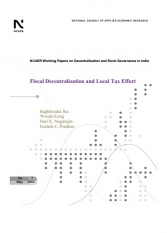Fiscal Decentralization and Local Tax Effort
Kailash Chander Pradhan
Hari K. Nagarajan
Raghbendra Jha
Woojin Kang
May 2012
This paper models the perverse impact of increased devolution of funds from higher to lower level governments (village councils or Panchayats) on tax revenues collected This paper models the perverse impact of increased devolution of funds from higher to lower level governments (village councils or Panchayats) on tax revenues collected by the latter. We show that transfers that do not adhere to the fiscal equalization rule will crowd out Panchayats’ revenue raising efforts. The extant literature has so far been unable to adequately explain the reaction of local effort to transfers from the higher level governments. Using a unique data set for India we theoretically model and measure the cost of taxation and use this and the ratio of transfers that augment the local wage rate to those that do not, after controlling for a number of village level characteristics, to explain tax collected at the village level. The estimation allows for mutual endogeneity of tax collected and transfers. We find that the cost of tax collection and the ratio of transfers that augment the local wage rate (to block grants) have a significant negative effect on tax collection, thus validating the conclusions of the theoretical model developed in this paper. Higher tax collection at the Panchayat level is associated with higher availability of village-level public goods. Several policy conclusions are advanced.
National Growth and Macroeconomic Centre







